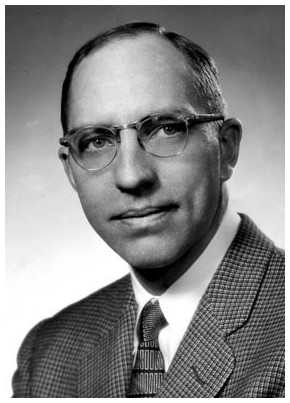|
LOREN L. HICKERSON
1918-1989

 Loren L. HICKERSON was born near Mount Ayr, Iowa, August 7, 1918. He graduated from Mount Ayr High School in 1936 and
from the University of Iowa in 1940 with a bachelors's degree in Journalism. On August 23, 1941 he married Ellen
CHRISTENSEN and they had two children, Karl and Sally. Loren HICKERSON was assistant director of publications and editor
of The Daily Iowan until 1942. During World War II, he served for two years on the aircraft carrier USS Langley in
the Pacific theater of operations.
Loren L. HICKERSON was born near Mount Ayr, Iowa, August 7, 1918. He graduated from Mount Ayr High School in 1936 and
from the University of Iowa in 1940 with a bachelors's degree in Journalism. On August 23, 1941 he married Ellen
CHRISTENSEN and they had two children, Karl and Sally. Loren HICKERSON was assistant director of publications and editor
of The Daily Iowan until 1942. During World War II, he served for two years on the aircraft carrier USS Langley in
the Pacific theater of operations.
After the war, he returned to the University of Iowa as an instructor in the school of Journalism. From 1947 to 1966 he
was Director of Alumni Records for the University of Iowa, and Executive Director of the Alumni Association. From 1966 to
1972 he served as Director of Community Relations for the University and from 1972 to 1980 he was Director of Community
and Media Relations for the University of Iowa Center for the Arts.
Loren HICKERSON also served on the City Council of Iowa City from 1966 to 1974, including two terms as mayor from 1968 to
1972. During this time he was involved in the controversies surrounding urban renewal in Iowa City. He provided strong
leadership for Iowa City during the student protests against the Vietnam War. He was a highly sought after speaker and a
productive writer who promoted pride in the state of Iowa and his community. He belonged to an extensive list of
organizations, including the American Alumni Council, the Iowa City Chamber of Commerce, the Governor's Commission on
Social and Economic Trends in Iowa, Sigma Delta Chi professional journalism fraternity, and the State Municipal Laws
Review Committee. Loren HICKERSON died on August 24, 1989 and was interred at Oakland Cemetery, Iowa City, Iowa.
Loren HICKERSON and his wife began donating his papers to the University of Iowa Libraries in 1985. Several additions
have been received over the years.

The Distinguished HICKERSON Alumni Recognition Award recognizes graduates or former students for outstanding
contributions to the Alumni Association. This award is named in honor of Loren HICKERSON, who was the UI's first
full-time alumni director.
1989 ~
Loren L. HICKERSON, 40BA, has given the best years of his life to the University of Iowa — as a student, a faculty member, the first full-time director of the UI Alumni Association, a founder and executive director of the UI Foundation, and director of Community Relations.
More than a magnificent advocate for the University, Hickerson was — and is — in love with the state of Iowa. In a prophetic series of essays he wrote for the Iowa Alumni Review in 1958, HICKERSON make an articulate plea for the future, warning that the state was losing its most promising citizens for lack of opportunity. And he foresaw that farming alone could not sustain the Hawkeye state.
HICKERSON'S skill as a wordsmith was honed at the University of Iowa, where he earned a bachelor's degree in journalism and served two years as editor of the Daily Iowan. In 1942, he was commissioned a U.S. Navy officer and served two years as an air operations officer aboard an aircraft carrier in the Pacific.
After the war, HICKERSON returned to the University, serving one year as an assistant to the director of publications and instructor in journalism before President Virgil HANCHER named him director of alumni records and executive director of the UI Alumni Association. In 1957, Hickerson accepted the additional title of executive director of the UI Foundation, the University fund-raising entity organized by the Association. Nine years later, Hickerson was promoted to director of Community Relations and from 1972 until his retirement in 1980 he served as director of Arts Center Relations.
Always willing to share his considerable expertise, HICKERSON served four years as mayor of Iowa City and was elected to two consecutive four-year terms on the City Council. He has served on many state and local agencies, including the Iowa League of Municipalities, the board of directors of FRIENDS of Educational Broadcasting, the Commission of Social and Economical Trends in Iowa, and the State Municipal Law Review Committee. As UI alumni director, he served on the board of directors, and then as president, of the American Alumni Council.
The Recognition Award is the second major honor the UI Alumni Association has bestowed on HICKERSON; in 1982, the Association presented him with a Distinguished Alumni Service Award. A life member of the Alumni Association, Hickerson is also a member of the Old Capitol Club.

Iowa City Press-Citizen
Iowa City, Johnson County, Iowa
2010, by Bob Hibbs
Iowa City's Fabulous 150 ~ Loren Hickerson, 1918 - 1989

Iowa City mayor (1966-72) and councilman who was always prepared to give three cheers for this community, spent a lifetime promoting university and local causes as UI alumni director, first UI Foundation director, and as fine arts spokesman. The Mt. Ayr native earned a UI journalism degree in 1940, served as Daily Iowan editor, and helped raise two children, while a sought-after speaker who promoted UI and local pride. During his City Council years (1966-74), including six as mayor, he worked tirelessly for downtown urban renewal and to help calm student outbursts during the Vietnam protest era.
~ Bob Hibbs

Quad-City Times
Iowa City, Johnson County, Iowa
December 06, 2011, by Don Doxsie
Man finds letters his dad exchanged with Iowa great Kinnick
Davenport resident Karl Hickerson was doing one of those things last spring that dutiful sons do.
His father, Loren Hickerson, had passed away in 1989, and a few decades later, Karl’s mother was moving out of the family’s Iowa City home. She needed help sifting through a mountain of memories.
Loren Hickerson had been a man of prominence, the editor of the Daily Iowan student newspaper in the early 1940s and later the mayor of Iowa City, the first full-time executive director of the University of Iowa Alumni Association and the University of Iowa Foundation and the university’s director of community relations.
He had donated his most significant papers to the university’s library. But he retained duplicates of the documents that defined his life.
“There was just tons of correspondence in cardboard boxes,” Karl Hickerson said. “I was trying to sort through it to see if there was anything there worth keeping.”
In the course of doing so, he came across something that prompted him to pause. Hidden away in a box were copies of letters his father exchanged with Nile Kinnick within a week after the Japanese attack on Pearl Harbor that launched the United States into World War II.
The letters are typed, single-spaced and surprisingly formal considering Kinnick and Hickerson knew each other. Seventy years later, their words drip with ambition, national pride and fervent hopes for worldwide peace and unity.
“I think my father was aspiring to be a leader back then, and he saw Nile Kinnick as a role model even though he actually was a contemporary,” Karl Hickerson said. “I think he admired Kinnick and was attempting to establish a network with him.”
By all accounts, the entire state of Iowa and most of the country admired Nile Kinnick.
With good cause.
Kinnick was more than just an irrepressible competitor on the football field. After leading the Hawkeyes to one of their most successful seasons in 1939, he won the Heisman Trophy, then delivered what many still consider the most stirring acceptance speech ever. He alluded to the war that already was raging in Europe and assured members of New York City’s Downtown Athletic Club that “the players of this country would much more, much rather, struggle and fight to win the Heisman award than the Croix de Guerre.”
Kinnick was an even better scholar, leader and person than he was an athlete, and many believed he was destined to become a national figure, perhaps a governor or senator if not president of the United States.
The shared ambitions and aspirations of Kinnick and Hickerson shine through in their correspondence.
On Dec. 10, 1941, just three days after Pearl Harbor, Hickerson wrote to Kinnick and said the unity he saw in the wake of Franklin Roosevelt’s speech declaring war on Japan was “the most stirring thing I ever expect to see.”
“All the fears I’ve felt so keenly since the outbreak of war in Europe in 1939 melted away, disappeared completely,” he wrote.
He said he had discovered that a spirit and unity still thrived in this country. He added that he felt Kinnick was destined to achieve great things in service to the nation.
“Granting that we pull through this war, as individuals, may we make every effort to meet in the halls of Congress, or on similar ground … when perhaps America may be living in a real peace among a world at real peace — for the first time in the history of civilization,” Hickerson wrote.
Kinnick’s response, dated Dec. 13, said Hickerson’s words struck a “responsive chord in my own nature” and that he, too, sensed renewed unity.
“It will be a long and bitter road to victory, but victory there will be, and with it the U.S. will have gained the world prestige she long ago should have earned,” Kinnick wrote.
Later in his letter, he added: “I share with you an innate desire to be of public service to my country … some day I would like to meet you as a fellow Senator or Representative in Washington, D.C. … Let us hope that you and I, and many, many others like us, will be enabled some day, somewhere, somehow to contribute in some small way to the peace and progress of the world. There is nothing wrong with dreams provided foundations are put under them.”
Hickerson was commissioned as an officer in the Navy the following year. Kinnick had preceded him into the service, reporting for duty as a naval aviator three days before the attack on Pearl Harbor. It’s almost as if he knew that a national crisis was just around the corner.
“It is the lot of our generation,” he noted in his Dec. 13 letter to Loren Hickerson, “to serve as military men first.”
Kinnick never got a chance to act on his dreams. Eighteen months later, during a routine training flight off the coast of Venezuela, the F4F Wildcat he was flying developed an oil leak and plunged into the Gulf of Paria. His body never was recovered.
But his words, thoughts, opinions and ideals survive, sometimes to be discovered by future generations in dust-covered boxes.

Source:
University of Iowa News Services, News Release of June 2, 2008
www.lib.uiowa.edu/
Transcription by Sharon R. Becker, 2008


| 

